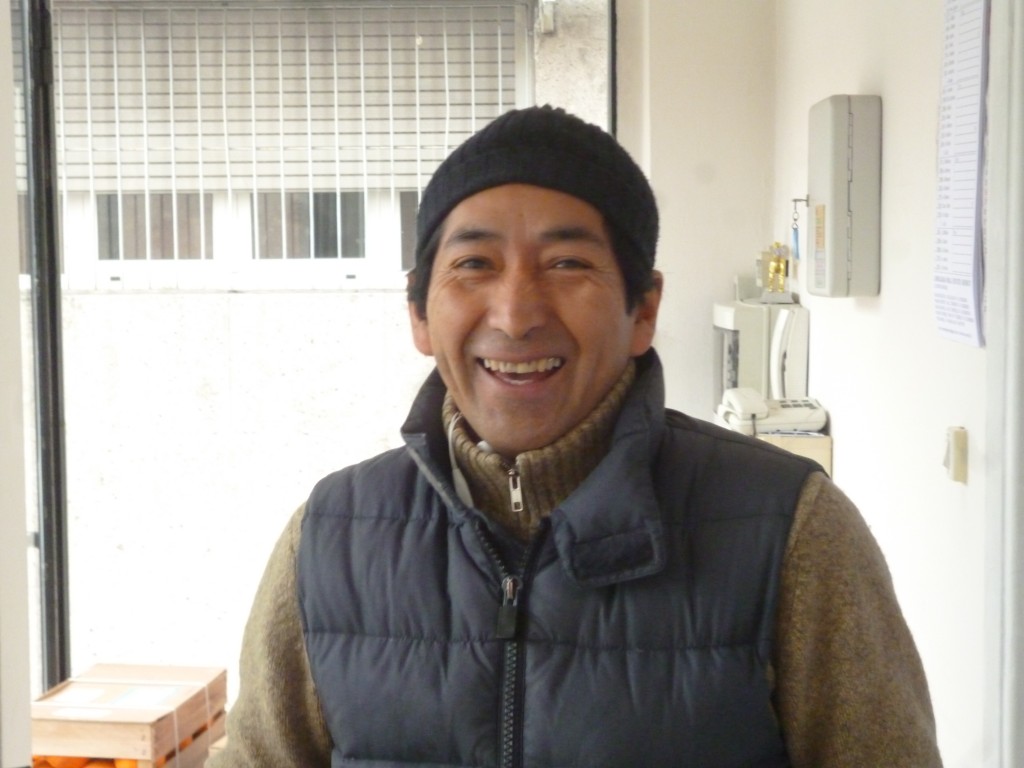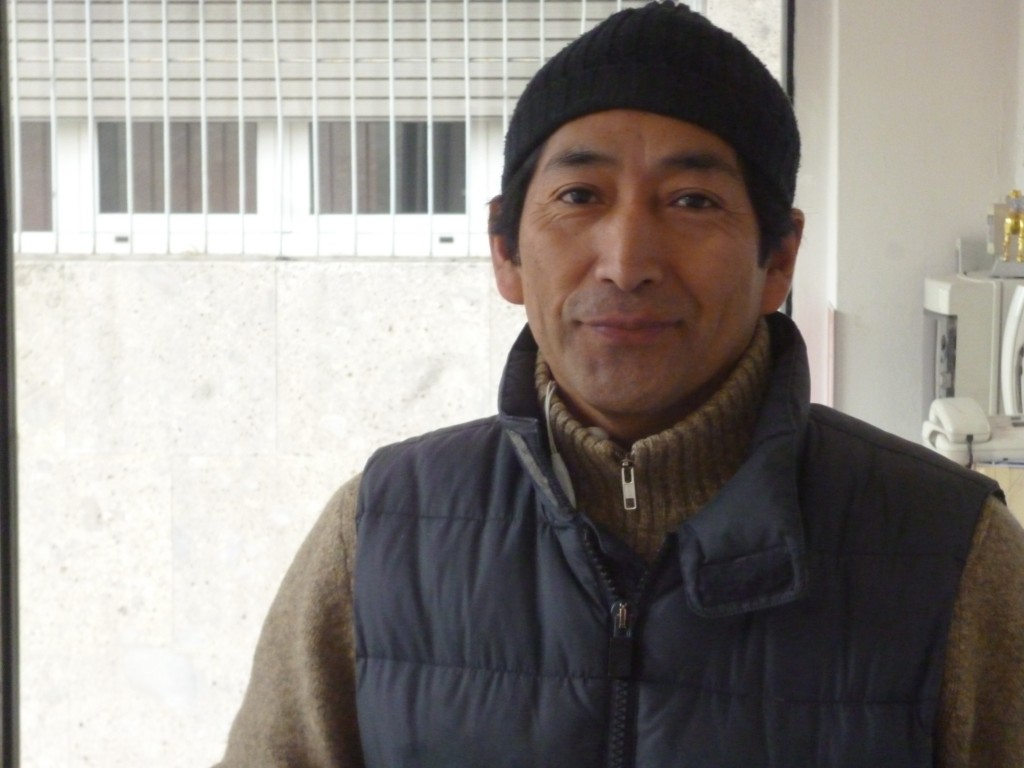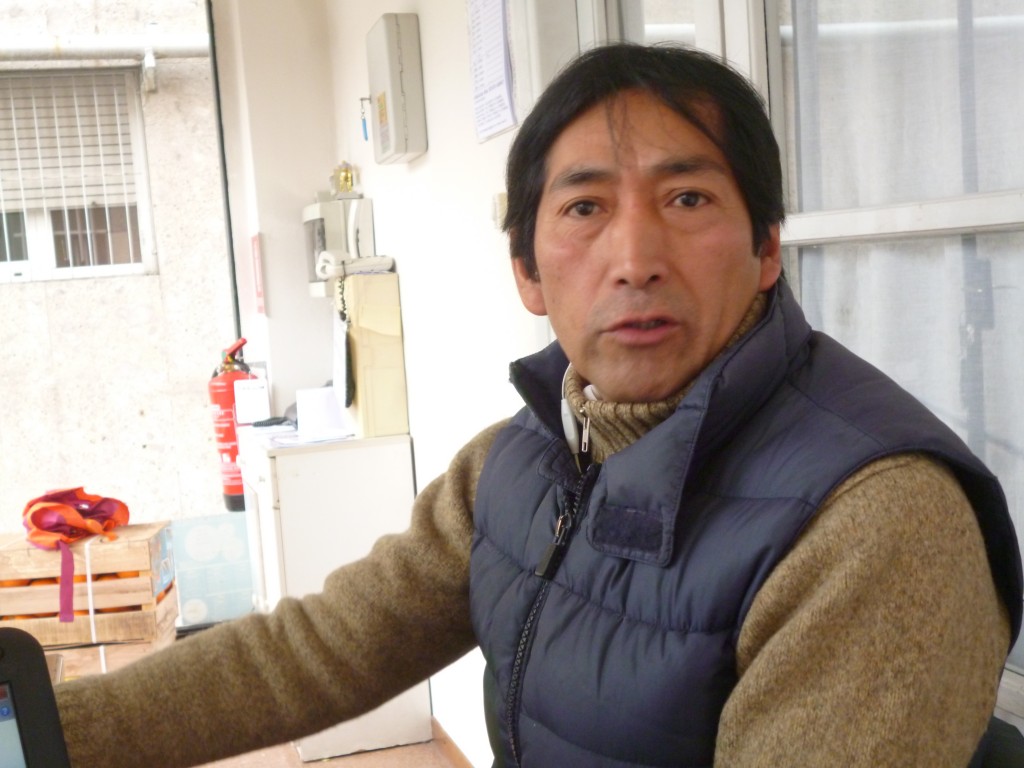The adventure of the wanderer: Raul from Lima to Milan, via the Upper Haullaga Valley
How did you end up in Milan?
I arrive from Peru, from Lima in March of 1994. My sister is already in Italy, having decided to leave several years earlier to work as a carer in Italy. She doesn’t want me to move, she fears I will not find any work. She says it’s very difficult for men, only women find work. But I don’t budge and in the end I manage to convince her. I contact an agency that organizes the trip and the arrival in Italy is done via Hungary. Up until Budapest everything’s fine. It’s there though the first problems start because we can’t find the car that’s supposed to take us to Italy. To start-off with I’m tempted to take a train – with some other ladies who are on the plane with me- then just before getting on the train, a man approaches us with the offer of a lift to Italy. 300 dollars per person, it’s a fare amount but we decide to try it out. We go through Austria and tempt to get in from Trentino, but they don’t let us through at the border. The only possibility is going through Slovenia. We manage to reach Ljubljana, but we wait a few days to try and get into Italy without a “passador”, person in charge of human trafficking. It’s not a nice trip, at some point we’re thrust on the ground, outside the car, on a traffic island. The travel companions cry, we’ve got to get onto another bus, then they tell us “ Get-off! Someone will guide you and you’ll cross the border on foot”. That’s how we arrive, after much walking and with someone who tells you they’re taking you to Italy and your not sure if it’s true or not… I get there, finally to Italy and in Milan at 17 hours on the 6th March 1994. At 29 years old.
And in Peru what do you do before hand?
My own, is a family of farmers, even though my mother takes care of a small village store. I’m the last of thirteen brothers and sisters, and when I’m a teenager my parents don’t want me to go to Lima. I arrive in Lima really young, lodged by one of my sisters, but then at 14 I already start living alone. Meanwhile I work and study (IT), then at some point I run out of money and have to quit studying. I work as a shop-keeper in a grocery store in Santiago de Sulco, and after a few years I open my own store. I really like my work, I like being amongst people, a job that gives me many satisfactions. I kept saying to myself from the start I’d work a bit and then continue studying, but earning a bit of money made me change my mind right away. I enjoy the good life, don’t like to drink but I often offer drinks, and spend more than is necessary. On top of that I make a few management slip-ups and over the span of a short period I’ve to give-up the business because of the many debts.
I leave the grocery store in my sister’s hands who manages in a short while to recapitalize the store and get it back on its feet.
At this stage you’re 20 years old…
So Yes, I’m not quite sure what to do in Lima. A friend says “Let’s go to the Selva, there’s work and the earnings are good”. “But what is there to do?”, I ask. “Nothing, but there’s a lot of work”. I was born in Lima, so I think to continue staying in Lima all my life. Put the offer is appetizing, so I decide to try-it-out, and go to Tingo Maria in the Selva. My friend tells me “There’s only four hotels, I’ll get there and come to look for you”. I head-off, reaching Tingo Maria, but hear nothing from my friend… I stay there a couple of days, but then I start to worry. Go back to Lima? Don’t even think about it. So I look for work, but find nothing. They pay really low wages, ten times less than the daily pay at my grocery store. I’m already at the fifth day, without any money, and I see a notice “Looking for a general waiter”. I enter the bar, two young guys scrutinize me, and I hear them say to one another “A perro has arrived”( dog in Spanish, editor’s note)and to me: “Listen Uncle (the owner, editor’s note) isn’t here yet, wait a bit”. When Uncle arrives he warns me “The wages aren’t much but I’ll give you a bed on the floor above”. We climb the stairs and right away I see a dirty mattress on the floor, far from the bed I picture. In the same room there are other mattresses, where other workers sleep. We start at 8 and finish at 24.
A very different life from the little shop-keeper in Lima, right?
The first thing I do is fetch a bucket, a rag and some muriatic acid. Without gloves. Uncle takes me to the bar’s sanitary to clean all the filth. There, at this moment I start crying and ask myself how I ended up here. It doesn’t last long. I say to myself this is – for now – my situation and must live-it to the very end. I stay six months as a jack of all trades then Uncle (Daniel) takes me to another place of his, and over a short period I become his right arm. So I start again enjoying the good-life, and when he’s not around I spend much time with his domestics and daughters. I have to keep an eye on the daughters, but in truth we go dancing together at the discotheque, and we have great fun. At some point though I work the maths out and say to myself “I’m not earning enough here”, even though I’m having a good time – the shows at the restaurant, with balls and singing, a pleasure. But it’s not enough for me. I ask around where I can go to earn more “you have to pick coca, near the Selva, that way you earn much more” they tell me. But I don’t want to work with coca. Don’t feel like it, that’s all. With the little money available, I decide to become a roving street-seller: the relationship with Uncle Daniel, is very good, he pays all that is owed-me, and so I start to buy all sorts of products, cassette players, table-cloths, and much more. I move between Aucayacu, Santa Rosa and Progreso. And I start working as a street-seller. Before arriving in Santa Rosa I notice for the first time the presence of guerilleros of the Sendero Luminoso. The first reaction was fear, I was alarmed. “Estan los cumpas” everyone says and at the port I speak with them – vendor, I say when they ask me what I do. I feel I’ve gotten away with it, but after a few days, one morning they force all the village residents – myself included – to gather in what looks like a stadium with thousands of people. At 14hrs they feed us, some sort of rice and tuna. Without cutlery. We use banana leafs as spoons avoiding to make any noise for the guerrilla imposes a strict discipline. Hours go by and nothing happens. At 19hrs they tell us “From now on there’s general strike throughout the Selva!” The manoeuvre is agreed upon around all the upper Huallaga valley, all roads are to be blocked-off and nobody is to be let-through. We have to merge on the Selva’s motorway. Very far-away. All in a line, thousands of people, all silent like at war. I think of the Vietnam war, we can’t even light a torch. The enemy is just on the other side and can shoot at any moment. An unreal experience, but the coordination works-out and we all start blocking traffic and seizing public transport. And I’ve also to write a billboard against the president “ Death to Garcia” – those who’ve been to secondary school must write. I’m frightened, but can’t say no.
And how did you get out of it?
The following day, and after a long hard day, after sleeping in the middle of the trees, in the dark. And in the middle of snakes. It’s a Guerrilla but we’re not guerrilla fighters. Even though, towards evening, we’re all bound to march all together, singing revolutionary songs. We’re heading towards the city of El Progreso, but the army is there. Without weapons, we are marching to our ends. In great fear. But one kilometre from El Progreso a message arrives: “Retreat!’ we find out the army is aware of the guerilleros’ plans and is waiting with levelled rifles in the city. So starts our retreat and finally I manage to free myself from the guerrilla’s grip.
And can you start work again?
For four years I’m a roving street-seller between the Selva (the forested area, editor’s note) and Sierra (the mountainous area, editor’s note). In those parts life is worth nothing. Twisters, snakes, crumbling bridges made with trees, thieves. In the Sierra I see people that have a great inner piece, they live carefree – with no electricity, gas, in wooden houses buying goods in small bars with shops inside. Many animals, they live like primitive humans. Eating whatever is found – deer, pig, turkey, monkey. I’d have stayed a few more years, but suddenly they tell me a friend of mine, roving street-seller like myself is dead. Killed by the guerrilleros because accused of being a spy. I know him, I know he’s innocent. But I tell myself if they’ve killed him, they could also take it out on me. So I become frightened and run-away, I decide to get-back straight away to Lima. With no money, with the few pennies I have in my pocket.
So in Lima you find yourself well?
Not anymore. A brother in law finds me a job as a mechanic, but it’s not my thing. I become a money changer, but I realize I can’t earn enough, and so I contact my sister who’s already in Italy and organize my departure.
And in Milan how do you find yourself?
I got accustomed right-away, I appreciate Italian culture – for instance, manners. Cars that stop at the red traffic lights, being on time, the museums. My daughters consider themselves Italian, they tell me “ You’re Peruvian, we’re Italian”.
Would you like to go back to Lima?
Yes I’d like to return to Peru one day: I’ve got down to distant-learning civil law. I’m in my second year. I’d like to return to be a Lawyer.
What has Milan and Italy done for you?
Italy has given and taught me a great deal. People read, keep informed and many Italians understand the Latin American situation. There’s more culture. And for me there’s been a full reception with full rights and obligations.
What have you done for Milan?
I created an association to help facilitate the integration of the Peruvian community in Milan. With Italian classes, conferences and seminars to help understand banks and all. I also contributed to the organizing of meetings between associations to exchange information and share projects.
Which moment in your life you recall with great pleasure?
When they invited me at a CGIL meeting, I thought I’d be talking to 40 people and there ended-up being more than 500. A full auditorium, I had to say what I thought about the politics. I prepared myself, and it went well, they clapped several times and in the end a long applause really touched me. And there, I also met a senator.
What’s your favourite dish and drink?
Ceviche- traditional Peruvian dish: fish fillet cooked in lemon, with a little chilly, ginger and celery. Lettuce and potato. With dried toasted corn, and a prawn. And as for drinks Cicha Morada – purple or black corn – or Inca cola.
What music you listen too? Or/and what book are you reading?
Peruvian music – The Grupo Nectar. Amongst the Italians I like Celentano. And as for books I’m reading a manual on commercial law…
A talent you have or you lack?
My ability to communicate and gain people’s trust. I’m resourceful but I’m not determined – I’d like to be more determined. I always say yes. For instance they tell me “ Can you drive a moped?” “Yes”, but never ridden one. So after 10 meters I fall off – at least far from view of the girl that lent it to me!
What have you learnt from life?
Keep strong, to be always optimistic. Sometime ago it was easier for me, lately I struggle a little more – but I don’t want to loose faith. Things have happened to me I thought I’d get-over easily, but that’s not the way it is.
Translation by Paolo Witte


